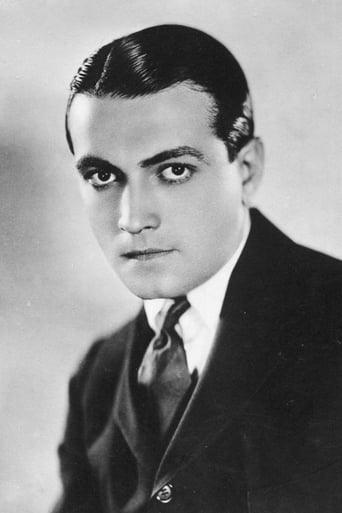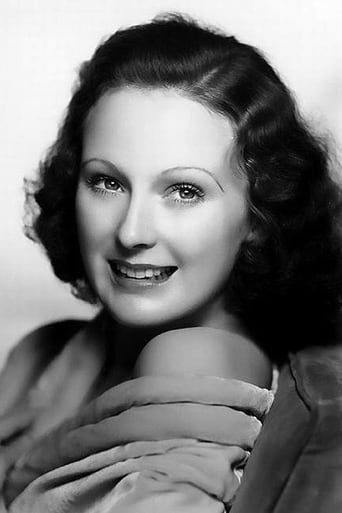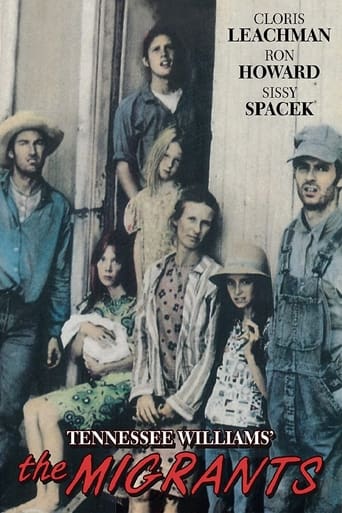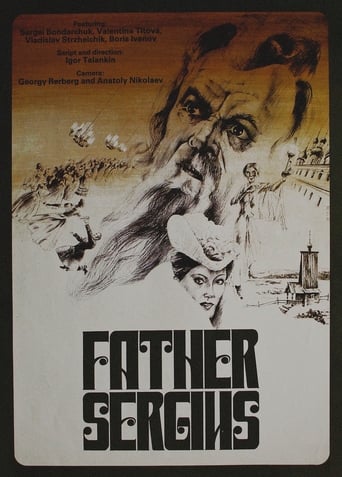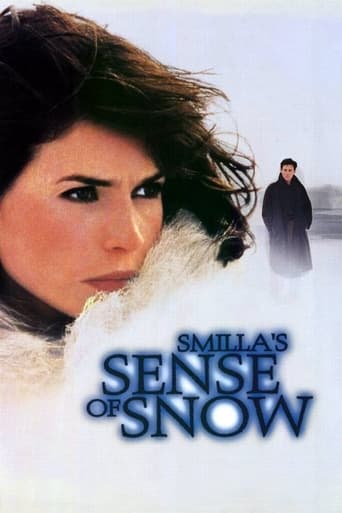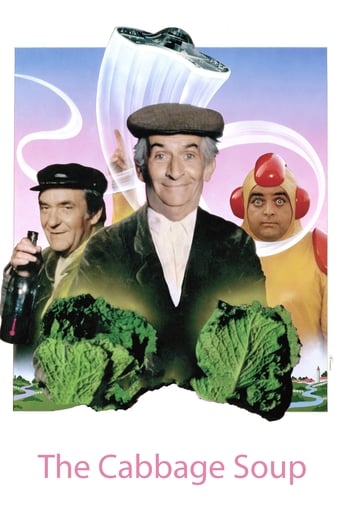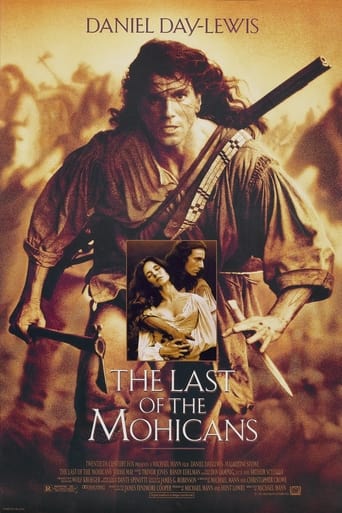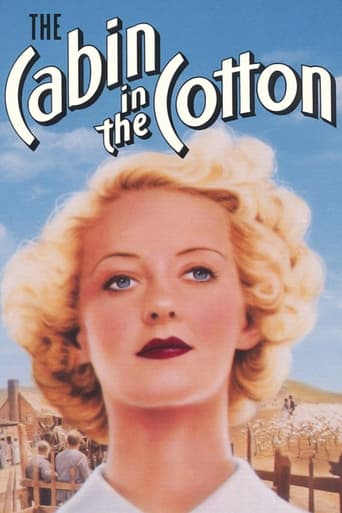
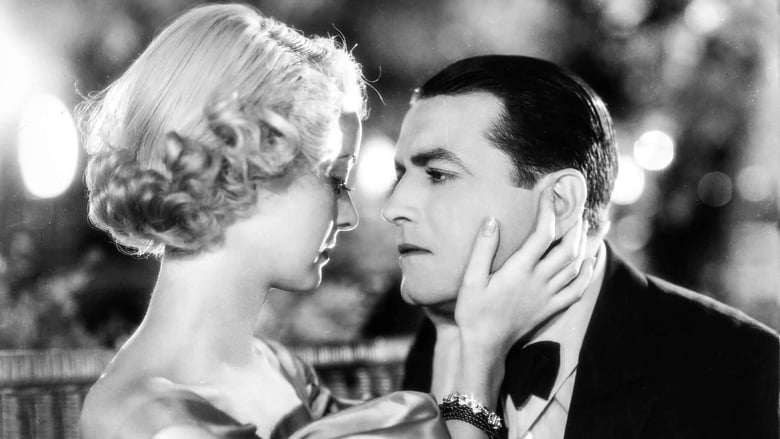
The Cabin in the Cotton (1932)
Sharecropper's son Marvin tries to help his community overcome poverty and ignorance.
Watch Trailer
Cast


Similar titles
Reviews
NOTES: Keighley told me he was the "dialogue director" on this film. Also see "Films in Review" October 1974.COMMENT: Although the Foreword is careful to point out that this film isn't going to take sides between the planters and the peckerwoods, it is pretty clear which side the scriptwriters favor. Certainly the planters do get a few arguments in, but Berton Churchill who plays his characteristic role of blustering double-dealing is hardly an ideal spokesman. Still, leaving aside the question of the rights and wrongs on either side - which is now only of historical interest anyway - the film has an engrossing story which is just as exciting to-day as when it was first presented back in 1932. If anything the film is much less dated than the usual plantation drama thanks to the skilled direction of Michael Curtiz which concentrates on a crisp and realistic handling and the script's development of character and its avoidance of some of the more usual melodramatic clichés. Two aspects I like are the genuine affection that obviously exists between father and daughter, never overtly stated but plain from their bearing and attitude towards each other, and the fact that Bette Davis receives no more than a climactic snub for her "sin" - actually none of the participants are punished for their crimes. Yes, this realistic script is a far cry from the tinselly, if idealistically "moral" reversions of normal human behavior that Hollywood was to turn out under the repressive hand of the Motion Picture Production Code. Curtiz's realistic handling is hampered in the early stages by the use of obvious stock shots and process backgrounds. Fortunately, this practice ceases quite early on. Curtiz directs the whole film in short, brisk takes (superlatively edited by George Amy). Barney McGill's exquisite photography also ranks as a major asset not only for his broodingly atmospheric night scenes and the sparkle and whiteness of the plantation house episodes, but for the wonders he has done with Bette Davis. Davis certainly looks most attractive in this made-to-order part of the rich and spoilt daughter. She acts with appealing vivacity too, making the most of such lines as "I'd like to kiss you, but I've just washed my hair!" Co-star Richard Barthelmess is inclined to over-do the facial expressions indicating indecision and is not too believable as a poor sharecropper (he is too well-groomed and speaks too well), but I like him. He has a personality that is exactly right for this kind of role. The rest of the cast is most capable.
In the case of every situation having three sides, only the truth is right here. The "Peckerwoods" (cotton field workers) and "Planters" (basicaly the man who gets the money...) all have pros and cons for each of their concerns in this depression era issue picture that showed slavery wasn't really dead. It just had a different name.Berton Churchill owns a large plot of land which he rents out to the "Peckerwoods" to tend. What they raise, they sell back to him. One of those "PW's" is David Landau who has worked for Churchill his whole life and ends up dying having barely hit middle age. He has raised an intelligent son (Richard Barthelmess) who wants to go to school, and Churchill notices potential in him, so he hires him. Already in love with poor, sweet Dorothy Jordan, Barthelmess must decide between her and Churchill's equally beautiful daughter Bette Davis, a flirt who has eyes on Barthelmess herself. Then, learning that some of the other PW's are stealing the cotton rather than selling it back to Churchill, Barthelmess is put in the position of betraying his own people.There is no real side to take. Both Churchill and the PW's are guilty of various crimes, Churchill for cheating his tenants and the PW's for theft and vandalism. This all sets up for a good plot, but unfortunately, due to some embarrassingly poor acting by Barthelmess, this ranks among Warner's weaker "poor man fighting rich man" dramas. This will always be known for a famous line uttered by Bette Davis (which was admittedly her favorite), and she really is the best thing about this movie. Her smile is radiant; Like that quote from "The Women", "She's got those eyes that run up and down a man like a searchlight." Churchill, too, is excellent; He instills his character with likability even though he's not totally honest. His character reminded me of Donald Crisp in "The Valley of Decision", a basically very good man with power trying to do the best he can, but sometimes abusing it a little. But Barthelmess was perhaps Warner Brothers' weakest leading men, genuinely boring. Something tells me he was better in silent movies. Davis had more "heat" from George Arliss. Someone like George Brent or Paul Muni would have had more presence, particularly in the final court room scene. The ending wraps everything up too neatly, something I fear would never have happened in the south in real life.
The workingman's studio, better known as Warner Brothers, did most of its social commentary films with an urban setting. Which in itself makes The Cabin In The Cotton a very unique product to come out of this studio. It's not a bad film, could have been better in delivering its message with a lighter hand. But what the Brothers Warner did was go back on an old standby.Watching The Cabin In The Cotton this morning put me in mind of a much better film in which Preston Sturges satirized the making of films like these. If you remember in Sullivan's Travels, director John L. Sullivan played by Joel McCrea wants to make films like these, the epic he wants to do is entitled Oh Brother Where Art Thou. But in order to sell it he's advised to make sure it has 'a little sex'.Which brings me to why The Cabin In The Cotton is remembered today at all. It's because of what Bette Davis brings to the film, a little sex. This film was a big milestone in her career as she plays the hedonistic daughter of that old southern planter Berton Churchill who keeps his sharecroppers, black and white, in virtual peonage.The lead Richard Barthelmess plays a bright young sharecropper's son and Churchill takes an interest in him, sending him to school to be educated because he has no son to help run the old plantation. What he does have is one sexpot of a daughter to keep Barthelmess on the side of the rich and privileged instead of finding true love with one of his own class in Dorothy Jordan.Churchill has been systematically exploiting the sharecroppers with high interest and cheating them on price. They in turn have been stealing cotton and selling bits of it on the black market. Henry B. Walthall and Russell Simpson have been leading the quiet peasant's revolt which threatens to get open and nasty. I'd have to say that the ending of the film has a forced and obvious conclusion both romantically and socially, but you'll have to see it for yourselves to find out.The Cabin In The Cotton is a dated, but historically valid film about conditions in the old Confederacy before the New Deal. But the sex that Bette Davis brings to her role is timeless.
As a social issue picture and an early breakout effort of Bette Davis, this movie shines! Miss Davis devours every scene she's in with her typical gusto! And it's her first performance as a Southern belle and contains the famous line, "Ah'd love t'kiss you, but Ah jes washed mah hayuh." Richard Barthelmess plays Marvin Blake, a poor sharecropper's son, to whom Bette's character Madge is drawn. The only problem is that Richard was thirteen years older than Bette and too old to be playing this part and it shows. This is not helped by the fact that he spends a large part of the picture overly made up. But he does a fine job and when he gets to play a wonderful scene at the end of the movie, giving an eloquent speech on behalf of the poor tenant farmers from whom he came, he relishes the opportunity! The tension of the movie is contained in Marvin's torn loyalties, the division of the haves and the have nots, and his physical attraction to Madge.My Mom, who watched this movie with me, commented that Bette was hyperactive, which goes a long way to explain her constant motion! This is a movie that explores feudalism in Thirties America and is a good commentary on injustice. The photography is lovely and it's directed by Michael Curtiz. (Casablanca) See it if you get the chance and enjoy!


